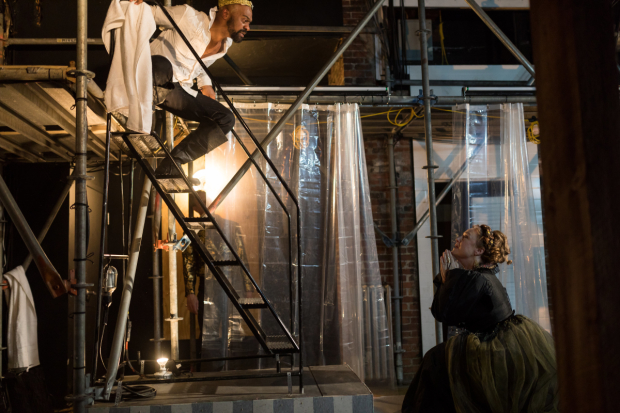Edward II
Christopher Marlowe gets a sexy and magnetic revival at Actors’ Shakespeare Project.

(© Maggie Hall)
Imagine a play so shocking that for 300 years it remained hidden from public view, collecting dust for centuries. Imagine again a revival of a play written in the 1500s that, when performed in 2017, just might be the year's most courageous and innovative coup de théâtre. That play is Christopher Marlowe's Edward II, and its current incarnation at Actors' Shakespeare Project, where it will run through March 19, is positively unmissable.
Controversial in its day because of the depiction of a homosexual relationship onstage, Edward II also prompted outrage because of Edward's blatant disrespect for the crown, and therefore the God that ordained him so. But a leader motivated not by duty to serve but rather by personal gain is one that will likely resonate with theatergoing audiences today.
Before the start of the play, Gaveston, a young man of ignoble blood, was exiled from England by King Edward I, presumably for being a little to close to his son, Edward II (the flawless Maurice Emmanuel Parent). The play begins just after the King's death, with Gaveston reading a letter from Edward II, the newly minted ruler: "My father is deceased; come, Gaveston, and share the kingdom with thy dearest friend." That invitation, it turns out, is beginning of the end for all involved.
Gaveston, played with flirty vulnerability by Eddie Shields, is intoxicated by the king's desire for him, and in his eyes is an almost possessed twinkle as he dreams of the luxury that awaits him by the King's side. An opportunist, perhaps, but there is little doubt that the affection between him and the King is real. (The King, by the way, is married to Isabella, played by Jennie Israel.)
For as drunk as Edward is on Gaveston, he is also high from his newfound power. The way that Parent shifts, sometimes in the same moment, from lovesick young man to a king mad with power, is hypnotic. Parent’s artistic wingspan is well known to Boston theatergoers, and his performance of Edward is a unique thrill that cements his status as one of the most astonishing talents on the Boston theater scene.
Lancaster (a terrific Nigel Gore) and Mortimer (filled out with playful menace by Alex Pollock) are two earls who remind Edward that they promised Edward's father that they would keep Gaveston away by whatever means necessary. Instead, Edward showers Gaveston with titles, even when Edward's brother, Kent (Nile Hawver), tries to talk some sense into him, to no avail. Isabella, who is feeling unwanted since Gaveston's return, cares for Edward enough to caution Lancaster and Mortimer against taking drastic action. Still, they threaten to depose Edward if he does not sign off on a new banishment for Gaveston. He signs Gaveston's exile and threatens vengeance on Lancaster and Mortimer.
While Jennie Israel is a tad stilted as Isabella, her tender performance does capture the spirit of a woman who suffers the misfortune of her husband being in love with someone else. The rest of the supporting cast is uniformly excellent, especially David J. Castillo as Prince Edward III.
This production takes big risks, yet almost all of them pay off. It is a high-concept, slickly stylized marvel that is both spectacularly erotic and totally heartbreaking — a brave production that marks a creative peak for Actors' Shakespeare Project and, I suspect, for most of those on the creative team.
It is not only the well-timed themes that make this Edward II a triumph, however. Rather, it is the seductively stylish and relentlessly edgy approach of director David R. Gammons, who has set the show in a baneful punk bathhouse in the bowels of the underground (the hellish, abandoned bathhouse is designed with sublime detail by Sara Brown.)
Gammons was inspired by both the bathhouses of the 1980s that became a sexual refuge for gay men during the AIDS crisis, and the notions of fascism and social control – and eventual extermination – of Nazi Germany. But the beauty of this nearly immersive production is that the play seems not to occur at any one particular time or place, refusing to be ascribed to the notions of "where" or "when". (Rachel Padula-Shufelt's fearless costumes underscore this.)
The world created inside the tiny Charlestown Working Theater is remarkable proof that smaller budgets need not stifle artistry and that intrepid attention to detail makes all the difference. Jeff Adelberg's lighting design is so exceptional that it feels like another character in the play. Flickering candles, dark shadows, exposed light bulbs, and institutional fluorescent lights, the lighting serves as each scene's punctuation in glorious ways. David Wilson's sound design is a singular achievement. Some scenes are filled with a low electrical hum, others with the sound of dripping pipes and an occasional announcement echoing from a far off room. But Wilson's other feat here – and one of this Edward's boldest choices – is his use of punk music to underscore some of the action.
While thematically relevant and still packing a somber punch 400 years later, this Edward II will likely be remembered as a conflagration of bold vision and unbounded creativity, an unforgettably perfect storm with a daring and dynamic leading performance at its mighty eye.









